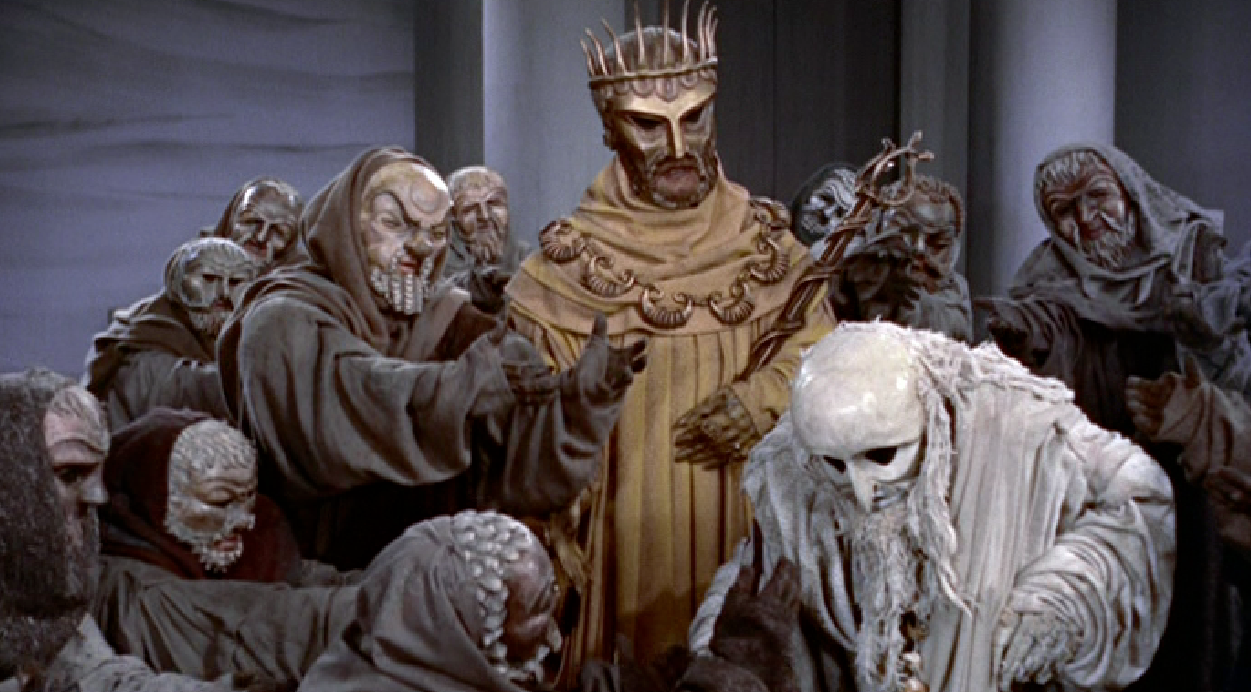نمایشنامه کلاسیک و رنسانس - Oedipus Rex
Oedipus Rex
Sophocles

Context: Greek Theater
Greek theater was very different from what we call theater today. It was, first of all, part of a religious festival. To attend a performance of one of these plays was an act of worship, not entertainment or intellectual pastime.
A second way in which Greek theater was different from modern theater is in its cultural centrality: every citizen attended these plays. Greek plays were put on at annual festivals (at the beginning of spring, the season of Dionysus), often for as many as 15,000 spectators at once. They dazzled viewers with their special effects, singing, and dancing, as well as with their beautiful language. At the end of each year’s festivals, judges would vote to decide which playwright’s play was the best.
In these competitions, Sophocles was king. It is thought that he won the first prize at the Athenian festival eighteen times. He is believed to have authored 123 plays, only seven of which have survived.
Oedipus the King: Importance
The story of Oedipus was well known to Sophocles’ audience. Oedipus arrives at Thebes a stranger and finds the town under the curse of the Sphinx, who will not free the city unless her riddle is answered. Oedipus solves the riddle and, since the king has recently been murdered, becomes the king and marries the queen. In time, he comes to learn that he is actually a Theban, the king’s son, cast out of Thebes as a baby. He has killed his father and married his mother. Horrified, he blinds himself and leaves Thebes forever.
The story was not invented by Sophocles. Quite the opposite: the play’s most powerful effects often depend on the fact that the audience already knows the story. Since the first performance of Oedipus Rex, the story has fascinated critics just as it fascinated Sophocles. Aristotle used this play and its plot as the supreme example of tragedy. Sigmund Freud famously based his theory of the “Oedipal Complex” on this story, claiming that every boy has a latent desire to kill his father and be with his mother.
Themes
The Willingness to Ignore the Truth
When Oedipus and Jocasta begin to get close to the truth about Laius’s murder, Oedipus fastens onto a detail in the hope of exonerating himself. Jocasta says that she was told that Laius was killed by “strangers,” whereas Oedipus knows that he acted alone when he killed a man in similar circumstances. This is an extraordinary moment because it calls into question the entire truth-seeking process Oedipus believes himself to be undertaking. Both Oedipus and Jocasta act as though the servant’s story, once spoken, is irrefutable history. Neither can face the possibility of what it would mean if the servant were wrong. This is perhaps why Jocasta feels she can tell Oedipus of the prophecy that her son would kill his father, and Oedipus can tell her about the similar prophecy given him by an oracle (867–875), and neither feels compelled to remark on the coincidence; or why Oedipus can hear the story of Jocasta binding her child’s ankles (780–781) and not think of his own swollen feet. While the information in these speeches is largely intended to make the audience painfully aware of the tragic irony, it also emphasizes just how desperately Oedipus and Jocasta do not want to speak the obvious truth: they look at the circumstances and details of everyday life and pretend not to see them.
The Limits of Free Will
Prophecy is a central part of Oedipus the King. The play begins with Creon’s return from the oracle at Delphi, where he has learned that the plague will be lifted if Thebes banishes the man who killed Laius. Tiresias prophesies the capture of one who is both father and brother to his own children. Oedipus tells Jocasta of a prophecy he heard as a youth, that he would kill his father and sleep with his mother, and Jocasta tells Oedipus of a similar prophecy given to Laius, that her son would grow up to kill his father. Oedipus and Jocasta debate the extent to which prophecies should be trusted at all, and when all of the prophecies come true, it appears that one of Sophocles’ aims is to justify the powers of the gods and prophets, which had recently come under attack in fifth-century B.C. Athens.
Sophocles’ audience would, of course, have known the story of Oedipus, which only increases the sense of complete inevitability about how the play would end. It is difficult to say how justly one can accuse Oedipus of being “blind” or foolish when he seems to have no choice about fulfilling the prophecy: he is sent away from Thebes as a baby and by a remarkable coincidence saved and raised as a prince in Corinth. Hearing that he is fated to kill his father, he flees Corinth and, by a still more remarkable coincidence, ends up back in Thebes, now king and husband in his actual father’s place. Oedipus seems only to desire to flee his fate, but his fate continually catches up with him. Many people have tried to argue that Oedipus brings about his catastrophe because of a “tragic flaw,” but nobody has managed to create a consensus about what Oedipus’s flaw actually is. Perhaps his story is meant to show that error and disaster can happen to anyone, that human beings are relatively powerless before fate or the gods, and that a cautious humility is the best attitude toward life.
Sight and Blindness
References to eyesight and vision, both literal and metaphorical, are very frequent in all three of the Theban plays. Quite often, the image of clear vision is used as a metaphor for knowledge and insight. In fact, this metaphor is so much a part of the Greek way of thinking that it is almost not a metaphor at all, just as in modern English: to say “I see the truth” or “I see the way things are” is a perfectly ordinary use of language. However, the references to eyesight and insight in the play form a meaningful pattern in combination with the references to literal and metaphorical blindness. Oedipus is famed for his clear-sightedness and quick comprehension, but he discovers that he has been blind to the truth for many years, and then he blinds himself so as not to have to look on his own children/siblings. Overall, the play seems to say that human beings can demonstrate remarkable powers of intellectual penetration and insight, and that they have a great capacity for knowledge, but that even the smartest human being is liable to error, that the human capability for knowledge is ultimately quite limited and unreliable.
Symbols
Oedipus’s Swollen Foot
Oedipus’s injury symbolizes the way in which fate has marked him and set him apart. It also symbolizes the way his movements have been confined and constrained since birth, by Apollo’s prophecy to Laius.
The Three-way Crossroads
A crossroads is a place where a choice has to be made, so crossroads usually symbolize moments where decisions will have important consequences but where different choices are still possible. In this play, the crossroads symbolizes fate and the awesome power of prophecy rather than freedom and choice.
Source: www.sparknotes.com

 سید شهاب الدین ساداتی
سید شهاب الدین ساداتی